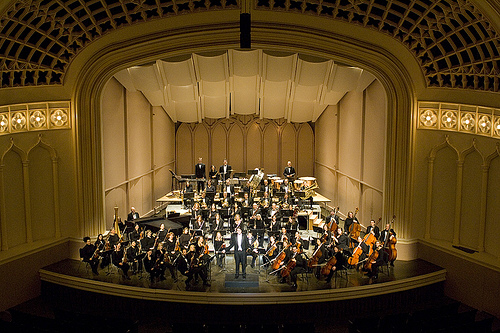Pianist Jon Nakamatsu weds technique and expression for Schumann’s Concerto
By Peter Alexander
Last night (Sept. 24) conductor Michael Butterman and the Boulder Philharmonic opened their 2017–18 season with “The Boulder Phil at 60,” a successful and well balanced program that featured an outstanding soloist, two great works, and a (relatively) new piece that that was co-commissioned with 47 other orchestras around the country.

Boulder Philharmonic Orchestra
The performance was introduced by Boulder City Council Member Jan Burton reading from a proclamation declaring Boulder Philharmonic Day, congratulating the orchestra for realizing its mission to reflect the Boulder community as well as for its longevity. While the program did not have the Boulder-centric focus of the recent seasons, it was received with enthusiasm.
The concert opened with Dreamtime Ancestors by Christopher Theofanidis. Commissioned by a consortium of orchestras in 48 of the 50 states, including the Boulder Phil for Colorado, it has been played around the country starting with its world premiere in 2015, and has now made its way to Boulder.
Dreamtime Ancestors was supposedly inspired by, and has titles reflecting, Australian Aboriginal spiritual beliefs, but you would be hard pressed to discern that in the music. The highly characteristic and mystical Aboriginal beliefs are reflected in only the most general way; about the best you can say is that Theofanidis tastefully avoids any patronizing faux-exoticism in the music.
Instead, the score is composed in a more-or-less contemporary Western orchestral style, with a discernable profile and structure that makes the music easily accessible. Avoiding any bold gestures, the music holds nothing that would disconcert a contemporary classical-music audience. Played with warmth and firm musicality by the Boulder Philharmonic, it made an unchallenging but agreeable opening for the concert.

Pianist Jon Nakamatsu
The first of the two great works was Schumann’s familiar Piano Concerto in A minor, played by soloist Jon Nakamatsu. The pianist’s sure technique was used in service of a deeply expressive performance that clearly moved the audience. In a work of many moods, his interpretation was striking for its use of gentle lyricism in the quiet, reflective moments to contrast with the more robust portions of the concerto.
This was especially effective in the slower middle movement, which was played with great beauty and tenderness. In the first movement, however, I found the style of the quieter moments overdrawn. Nakamatsu’s lyricism was lovely, but the tempo sometimes slowed so much that these quieter passages seemed to interrupt the overall momentum and continuity of the movement.
The contrasting moods were better matched in the finale, which danced along convincingly as Nakamatsu met every expressive demand. Butterman and the orchestra provided secure support for his interpretation. A standing ovation from a nearly-full Macky Auditorium brought Nakamatsu back onstage for a lovely and touching encore performance of Chopin’s Fantasie-Impromptu.

Michael Butterman
The orchestra came into its own for the other great work, forming the full second half of the concert: Dvořák’s Symphony No. 7 in D minor. Sometimes celebrated as the composer’s greatest symphony, the Seventh is less known, and notably more somber than either the cheerful. folkish Eighth Symphony or the ever-popular Ninth Symphony, famously composed in the New World.
This symphony is a challenge for both conductor and orchestra, requiring stylistic commitment and perception, as well as musical precision and control. Butterman and the Phil met the challenges head on, with a strong conception of the work. The very beginning was a little ragged in pitch and rhythm—a reflection of the musicians having been apart for the summer?—and the orchestral sound was not initially consistent, lacking a solid core.
Happily, the players soon settled in and the performance grew stronger and stronger. Individual moments were musically expressive throughout, and the first movement ended forcefully. The second movement was stylish and well paced. The third movement, titled only “Scherzo,” has an obvious folk-dance quality throughout, a feeling that was well captured by Butterman and the Phil.
The stormy finale was the best movement, with well controlled pacing that reflected the composer’s calculated withholding of a major-key resolution until the very last measures. Individual players shone in their solo passages, including one of the best propulsive punches for a timpanist to be found anywhere in the orchestral world. Once again the audience stood, celebrating Boulder’s fine orchestra, its remarkable 60-year history, and the successful start of a new season.





 Of the two, the
Of the two, the 









